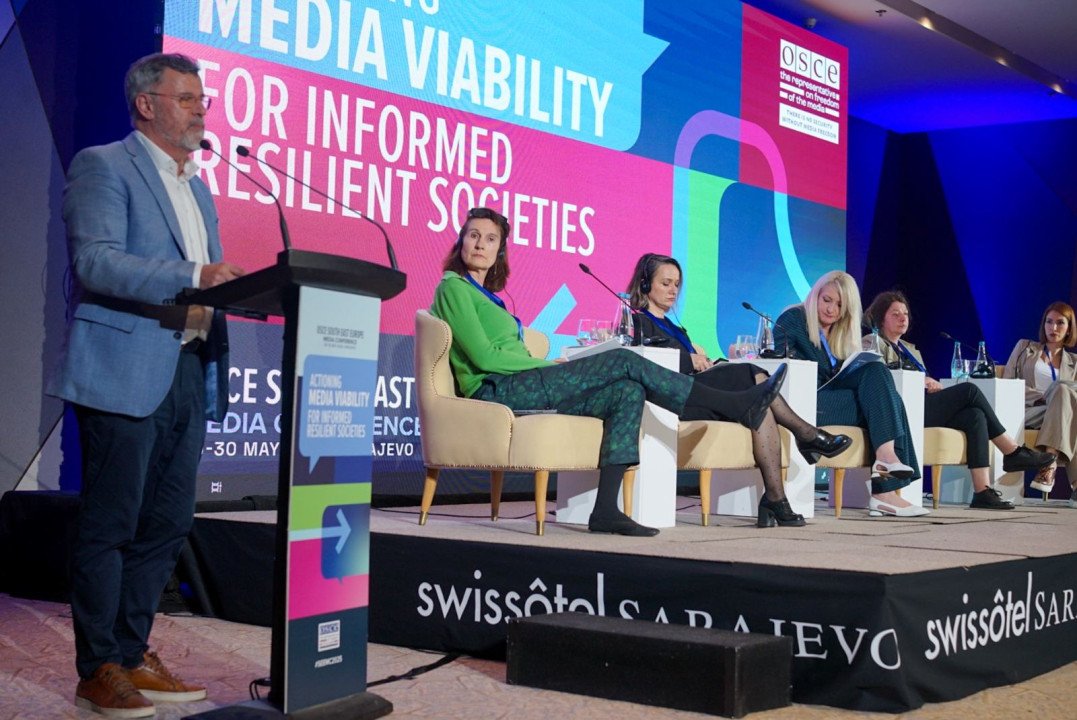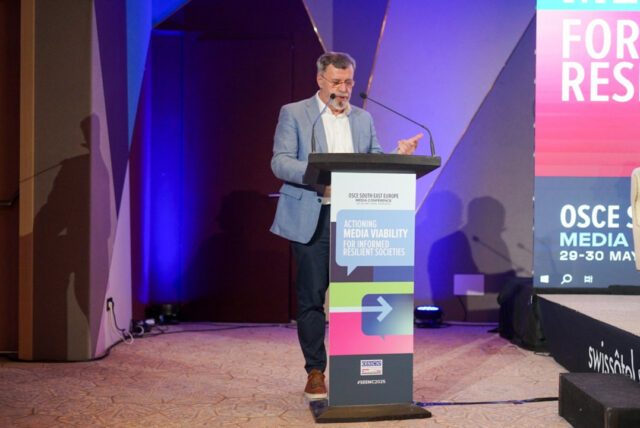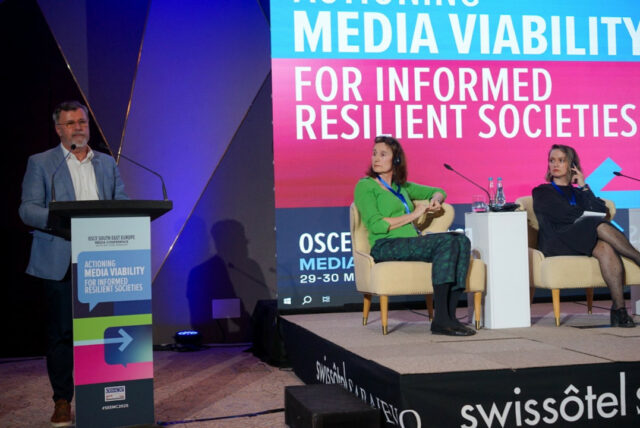Veran Matić: Novinare u Srbiji tuku, hapse, zastrašuju i prisluškuju, a EU ćuti

Autor: Veran Matić (scroll to the text translated into English)
Za to vreme, EU ćuti, dok ostali u regionu gledaju koliko će vlastima u Beogradu da „prođe”.
Sve što im „prođe”, a „prolazi” im sve kod jedinog još kakvog takvog kontrolora u procesu pridruživanja (a to je Brisel), odmah se preslikava u celokupnom okruženju.
Zato je ceo region, u stvari, u šaci nekoliko moćnika, koji nekažnjivošću zločina i nasilja nad novinarima, kontrolišu narativ slobode medija u čitavom regionu.
Strah i osećaj nemoći novinara koji se nađu pod tim čekićem, dodatno pojačava nedostatak ili prisustvo prividne solidarnosti. Za njih nema sistemskih rešenja, već se sve svelo na par pojedinaca i entuzijasta…
Od početka studentskih protesta, zabeležili smo više od dvadeset samo fizičkih napada na novinarke i novinare, od kojih nijedan nije procesuiran. Napadi uglavnom dolaze od strane partijske parapolicije vladajuće stranke, sastavljene od pojedinaca kriminalne prošlosti i verovatno sadašnjosti. Oni često naređuju i prisutnim pripadnicima policije, koji se ne mešaju u ove napade, već često uklanjanju novinara sa radnog mesta, a napadača ne legitimišu, niti privode.

Jedan novinar nedavno se hvalio kako on izbegava napade tako što se maskira u nasilnika, huligana i umeša među njih.
U isto vreme, imali smo i izjave da je na jednom nasilnom skupu deo policije oblačio press prsluke.
Tabloidi svakodnevno teškim optužbama targetiraju novinarke i novinare, ali to nije dovoljno, već i direktor jednog tabloida izlazi na ulicu da bi pretukao vodećeg istraživačkog novinara. Tužilaštvo kaže da nema mesta da se goni po službenoj dužnosti.
U prošloj godini, od 62 formirana predmeta u evidenciji Vrhovnog javnog tužilaštva, imali smo samo jednu osuđujuću presudu za pretnje novinarima. Na više od pola ovih slučajeva, na zahtev tužilaštva za prikupljanje obaveštenja, policija to nije uradila.
Novinari i redakcije izloženi su, da upotrebim pomodni termin, hibridnim ratovima. Redakcija Krika ima 19 SLAPP tužbi, koje im odnose silno vreme i energiju, ali donose i neizvesnost. Sudija Apelacionog suda (koja je bila u apelacionom veću koje je oslobodilo optužene za ubistvo novinara Slavka Ćuruvije, koji su prvo bili osuđeni na 100 godina zatvora), sa svojim suprugom advokatom, tužila je ovu redakciju, zahtevajući kazne zatvora za urednika i novinarku od 10 meseci i zabranu obavljanja novinarskog posla na nekoliko godina, samo zbog toga što su objavili podatke o imovini, prikupljene iz javno dostupnih izvora, i to tačne. Tri novinarke Krika, imale su nasilne upade u stanove bez ikakvih rezultata, kada je reč o istragama. Svakodnevno targetirani podnose tužbe i provode dodatno vreme pred sudovima, štiteći svoj integritet, čast i ugled.
Imamo ugrađivanje špijunskih softvera u mobilne uređaje novinara i aktivista, bez reakcija istražnih organa.
Institucije se bave uglavnom zaštitom političkog establišmenta, oligarhiije. Protiv njih, krivične optužnice postaju tajna i retko dobijaju epilog. Nedavno je iz Brisela stigla sugestija o nekim promenama u Zakonu o javnom informisanju i medijima, koja treba da štiti pretpostavku nevinosti, tako formulisan član zakona koji bi uništio istraživačko novinarstvo jer se ne bi mogle istraživati koruptivne i druge radnje upravo onih koji ih najviše čine, sa najvećim posledicama.
Broj profesionalnih medija se svake godine sve više smanjuje. Novinari se najčešće sele u druge profesije.
Vlasti sve čine da podriju finansijsku stabilnost, tamo gde je ima. Na konkursima za projektno sufinansiranje, odvija se pljačka velikih razmera. Oko 15 miliona evra dodeljuje se uglavnom provladinim medijima, tabloidnim medijima i onima koji su osnovani samo da bi izvlačili taj novac. Povlačenje donatora prošle godine bio je dodatni udarac.
…
Morao sam da podvučem ove primere kako bih vam približio realnu sliku represije u Srbiji prema medijima danas.
Međutim, Srbija ima i veliku nadu u studentskom pokretu, studentskim blokadama svih univerziteta, sa zahtevima da se poštuje pravna država i da institucije rade.
Vlast ne samo da nije htela da ispuni zahteve, već svakodnevno organizuje kampanje blaćenja, a takođe i fizičke napade. Zabeleženo je preko 70 napada, uglavnom pri mirnim protestima ili komemorativnim manifestacijama: gaženja automobilima studenata postali su uobičajeni, prebijanja i drugi fizički nasrtaji.
Takođe od strane parapolicijskih snaga.
Pošto nisu ispunjeni zahtevi, studenti su sada tražili izbore.

Ovaj pokret doneo je sa sobom nove paradigme, nove vrednosti uspostavljajući generacijsko jedinstvo bez obzira na nacionanost, ili deo zemlje. Razlike se stavljaju u stranu, a pamet i kreativnost u prvi plan.
Način organizovanja, donošenja odluka, upravljanje blokadama i protestima, govori nam o jednoj novoj demokratskoj Srbiji, Srbiji pravde i pravednosti, u kojoj institucije rade čuvajući ustavni poredak i zakone, Srbiji sa medijima koji infrormišu i obrazuju, Srbiji u kojoj žele da ostanu.
Danas svedočimo kako nešto što je do juče bilo nadmoćno u gotovo svemu, postaje nemoćno. Vidimo kako sve ono što je do juče bilo nadmoćno svakom pokušaju osporavanja, kritike i razobličavanja, postaje nemoćno. Potrošeno. Nedelotvorno. Golo.
Ostaje samo sila koju moramo zaustaviti da se ne pretvori u još jednu traumu, jer nam je previše trauma.
Nada kakvu donose studenti u Srbiji je potrebna celom svetu, i u moru loših vesti iz Srbije, ovo je ona oko koje svi nastojimo da se okupimo.
A veoma nam je bitna i podrška institucija koje su važne za našu zemlju, u prvom redu Evropske komisije, Saveta, i Parlamenta, ali i OEBS-a.
Studenti iz Niša sa Filozofskog fakulteta su tu sa nama. Pozdravimo ih.
Veran Matić: Journalists in Serbia are being beaten, arrested, intimidated, and wiretapped, while the EU remains silent
In Serbia, journalism is under intense, constant attack, which comes from all sides. At the same time, laws are being adjusted in order to legalize the government’s control of the media, and the process of electing members of the REM Council, which is supposed to monitor the media, is being manipulated. The entire police-judicial system is harnessed against journalists. Journalists are beaten, arrested, intimidated and eavesdropped. They are persecuted and called traitors by the highest authorities, and numerous pro-government media outlets daily broadcast the manhunt for the centers of evil, as certain newsrooms are called.
In the meantime, the EU is silent, while others in the region are watching how much the authorities in Belgrade will “get away with”.
Everything they “got a way with”, which is a lot, given that the only other such controller in the accession process is Brussels, is immediately being reflected in the entire environment.
That is why the entire region is, in fact, in the hands of a few powerful people, who control the narrative of media freedom in the entire region with impunity for crimes and violence against journalists.
The fear and sense of powerlessness of the journalists who find themselves under the hammer, further reinforces the lack or presence of apparent solidarity. There are no systemic solutions for them, but it all came down to a few individuals and enthusiasts…
Since the beginning of the student protests, we have recorded more than twenty physical attacks on journalists, none of which have been prosecuted. Attacks generally come from the ruling party’s party parapolice, made up of individuals with criminal pasts and possibly current ones. They often issue orders to the present members of the police, who do not intervene in these attacks, but often remove journalists from their workplaces, while they do not legitimize or arrest the attackers.
A journalist recently boasted that he avoids attacks by masquerading as a thug, a hooligan, and mixing in with them.
At the same time, we also had statements that part of police officers wore press vests during a violent rally.
Tabloids target journalists with heavy accusations every day, but that’s not enough, the director of one tabloid goes out on the street to beat up a leading investigative journalist. The Prosecutor’s Office says there is no basis to prosecute him ex officio.
Last year, out of 62 cases in the records of the Supreme Public Prosecutor’s Office, we had only one conviction for threats to journalists. In more than half of these cases, at the request of the prosecution to collect information, the police did not acted upon it.
Journalists and newsrooms are exposed to, to use a fashionable term, hybrid wars. The KRIK editorial office has 19 SLAPP lawsuits, which take a lot of time and energy, but also bring uncertainty. The judge of the Appellate Court (who was in the appellate panel that acquitted the accused for the murder of journalist Slavko Ćuruvija, who were initially sentenced to 100 years in prison), together with her lawyer husband, sued this newsroom, demanding 10-month prison sentences for the editor and the journalist and a ban on journalistic work for several years, just because they published accurate information about their assets, collected from publicly available sources. Three Krik journalists had violent raids on apartments without any results when it comes to investigations. Every day, those targeted file lawsuits and spend additional time in court, protecting their integrity, honor and reputation.
We face with the installation of spyware in the mobile devices of journalists and activists, without the reaction of investigative authorities.
Institutions deal mainly with the protection of the political establishment, the oligarchy. Against them, criminal indictments become secret and rarely have an epilogue. Recently, a suggestion came from Brussels about some changes in the Law on Public Information and Media, which should protect the presumption of innocence, an article of the law formulated in such a way that would destroy investigative journalism because it would not be possible to investigate the corrupt and other actions of those who commit them the most, with the greatest consequences.
The number of professional media is decreasing every year. Journalists most often move to other professions.
The authorities are doing everything to undermine financial stability, where it exists. Large-scale robbery is taking place at tenders for project co-financing. About 15 million euros are allocated mainly to pro-government media, tabloid media and those that were founded just to extract that money. The withdrawal of donors last year was an additional blow.
…
I had to underline these examples in order to bring you closer to the real picture of repression of the media in Serbia today.
However, Serbia also places great hope in the student movement, student lockouts of all universities, with demands that the rule of law be respected and that the institutions perform their work.
Not only that the authorities did not want to fulfill the demands, but they also organize smear campaigns and physical attacks on a daily basis. Over 70 attacks were recorded, mostly during peaceful protests or commemorative events: running over students with cars became common, along with beatings and other physical attacks. Also conducted by parapolice units.
Since the demands were not met, the students have now demanded elections.
This movement brought with it new paradigms, new values establishing generational unity regardless of nationality or region of the country. Differences are put aside, and intelligence and creativity come to the fore.
The way of organizing, making decisions, managing lockouts and protests, tells us about a new democratic Serbia, a Serbia of justice and fairness, in which institutions work preserving the constitutional order and laws, a Serbia with media that informs and educates, a Serbia where the students want to stay.
Today we are witnessing how something that until yesterday was superior in almost everything, becomes powerless. We see how all that which until yesterday was superior to any attempt to dispute, criticize and debunk, becomes powerless. Spent. Ineffective. Bare.
There remains only a force that we must stop from turning into another trauma, because we have too much traumatic experiences.
The hope that the students in Serbia bring is needed by the whole world, and in the sea of bad news from Serbia, this is the one around which we all strive to gather.
Therefore, the support of institutions that are vital for our country is of utmost importance to us, first of all the European Commission, the European Council, and the European Parliament, including OSCE.
Students from Niš from the Faculty of Philosophy are here with us. Let’s greet them.


